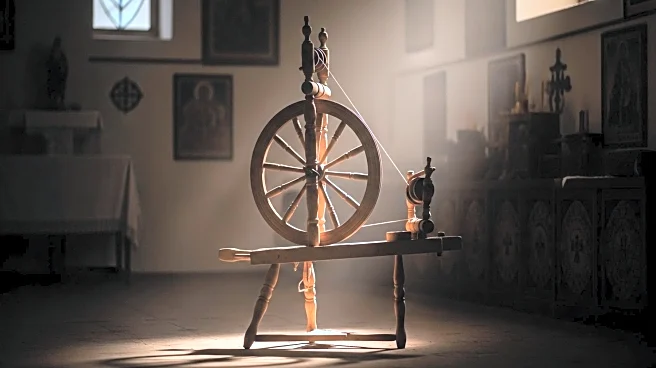What's Happening?
Mona Fastvold's film, 'The Testament of Ann Lee,' explores the life of Ann Lee, the founder of the Shakers, a radical religious movement from the late 1700s. The film, starring Amanda Seyfried, follows Lee's journey from her childhood in Manchester to her establishment of the Shakers in America. Lee's experiences with religious visions and her decision to renounce fornication are central to the narrative. The film is noted for its visual beauty, using 70mm cinematography and natural lighting to convey spiritual wonder. It also features musical elements, with Daniel Blumberg adapting traditional Shaker hymns into the film's score.
Why It's Important?
The film highlights the historical significance of Ann Lee and the Shakers, a group that challenged conventional religious practices and societal norms. By focusing on Lee's personal convictions and the formation of a community around her beliefs, the film offers insights into the power of faith and the impact of religious movements on society. It also underscores the role of women in religious leadership, a topic of ongoing relevance in discussions about gender equality and religious reform. The film's artistic approach may influence how historical religious figures are portrayed in cinema, potentially inspiring more nuanced and visually compelling narratives.
What's Next?
The film's release may spark renewed interest in the Shakers and their contributions to American religious history. It could lead to discussions about the role of religious movements in shaping cultural and social landscapes. Additionally, the film's unique blend of biography and musical elements might encourage filmmakers to explore similar creative approaches in future projects. Audience reactions and critical reviews will likely shape the film's legacy and its impact on the genre of historical religious films.
Beyond the Headlines
The film raises questions about the intersection of faith and personal autonomy, particularly in the context of Ann Lee's rejection of traditional marital roles. It also touches on themes of persecution and the search for religious freedom, which remain relevant in contemporary discussions about religious tolerance and diversity. The portrayal of Lee's visions and spiritual experiences invites viewers to consider the nature of belief and the ways in which personal convictions can drive social change.











